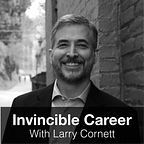
Did you know that people lose interest in your conversation if you talk longer than 40 seconds uninterrupted?
To make matters worse, our bodies release dopamine when we talk about ourselves. The more we talk — and hear ourselves talk — the better we feel, so the more we talk.
We become addicted to that good feeling. It’s no wonder that — on average — people spend 60% of their conversations talking about themselves and up to 80% when using social media.
Couple that with feeling nervous during a job interview or a challenging meeting, and you may end up running your mouth a lot! I previously shared the horror story of a stressful one-on-one meeting with one of my managers. The more he smiled and silently nodded, the more I kept babbling and rambling. On and on and on…
Some of the best professional advice I received was to know when to shut my mouth. I met with an executive several years ago, and he shared some valuable feedback.
He had been watching me present, pitch, debate, and negotiate in meetings. I don’t remember his exact words, so I’m paraphrasing a bit here:
“You have to know when to stop and be quiet. Pay attention, read the room, and recognize when you’ve won the argument. I’ve watched you. You keep going for the kill to hammer it home. You’ve already won, but you keep talking and selling. Stop. Just stop. Take your win and walk away.”
That feedback burned into my brain. From that moment on, I have been hyperaware during meetings and conversations.
I may have 10 selling points, but if someone says “Yes” after the third one, I stop and take the win. There’s no need to run the conversation into the ground with my burning desire to get through my whole pitch.
For example, many years ago, my startup co-founders and I were pitching to raise our Seed round. I had created a full pitch deck with the company's vision and mission, our founding team, the product concept, competitive landscape, business model, product roadmap, revenue forecast, the works.
We were meeting with an angel investor, and I don’t think I made it through more than 4-5 slides when he said, “Ok, I’m in. What do you need from me?”
I promptly closed my laptop and ended the presentation. One of the co-founders started talking about the sales pipeline or something. I shot him a quick warning look, and he closed his mouth.
We briefly explained what we wanted, and the investor said, “Ok, send me the details.”
That was it. We took the win, stood up, shook his hand, said, “Thank you!” and drove a few miles down the road to celebrate.
If you’re rambling during meetings, presentations, and job interviews and your answers are scattered and incoherent, it's probably because:
Lack of focus
Lack of preparation
Lack of practice
Lack of conversational skills
Identify the primary focus
What is your goal with the conversation? What outcome do you want? What do you want the listener to do?
It should be pretty clear what you want with a job interview. But other discussions and meetings may require a focus.
Are you trying to educate the listener?
Are you selling something?
Are you trying to persuade someone?
Are you trying to convince the listener to do something?
Are you trying to explain why something went wrong?
What do you want to happen as a result of this conversation? That will be your primary focus that guides every word that comes out of your mouth. No more and no less.
Create a speaking framework
Do you think any of the Hollywood movies you've enjoyed watching were total improv? Of course not.
They wrote and rewrote the scripts hundreds of times. Hell, maybe thousands of times from concept to the final performance.
So, write your own script for your next important discussion. Using your overarching goal and what you want the conversation's focus to be, create a speaking framework that will guide you.
Keep it simple for a couple of reasons:
It will be easier to remember what you want to say.
It will keep you from talking too much.
How do you want to open the discussion? What’s the key point you want to make? What’s the hook to grab their attention (e.g., “Did you know that we are wasting $5M a year on office supplies no one uses?”). Write a brief intro, the pitch, or the background you need to explain (keep it short).
What are the key points that you need to make? You may have dozens of things you want to say or a long list of wonderful selling points, but resist the urge to ramble through them all.
When you do that, you’ll put people to sleep and forget half of them. Prioritize and pick the top three points. Focus on making those tight and powerful.
Use interesting real-world examples and stories for greater impact. The best storytellers know that human beings love a good story. Check out the “But & Therefore Rule” from “South Park” co-creators Trey Parker and Matt Stone.
Finally, write your closing statement. How do you want to wrap up? What’s your final pitch, selling statement, or memorable thing you want to leave the listener with?
Practice, practice, practice
You should be practicing your material dozens of times. For example, a couple of years ago, I spent over 50 hours rehearsing out loud and recording myself on video for a 1-hour presentation.
And, it still wasn't perfect. But, at least it wasn't a disaster.
You may be thinking, “Sure, that makes sense for a presentation. But, this is just a meeting with someone.”
If you are going to be in an important meeting, you should do some rehearsal to think through what you want to say and how you will say it. Lack of preparation and practice is one of the biggest reasons most meetings suck and people are burned out.
Don’t be the cause of a meeting that is a waste of time. No one wants to hear you ramble and drone on and on without getting to the point.
If you're still thinking, "Oh, that's too much work," then stop complaining when people say that you come across as uncertain, unfocused, and long-winded. If you don’t want to put in the effort to practice for a job interview, stop whining when you don't get an offer.
Do you want the damn job?
If you don't, then don't worry about it. Watch some Netflix instead of practicing.
If you do want the job, put in the work. It takes considerable effort to research and rehearse so much that you sound polished yet natural.
Read through your outline and material, and start editing. Your first draft is always terrible.
Read and refine again. Run it through tools like Grammarly because your writing probably sucks. We all suck without years of practice.
Now record yourself on video saying it out loud without reading everything word for word. Glance at your notes but speak to the camera (your next meeting will probably be in Zoom anyway). You'll notice that you forget a lot. Yep. That's why you’re practicing.
Rehearse until you can present or answer questions completely without reading your notes.
Now you have your material committed to memory, but you sound like a damn robot.
So, rehearse more and riff on things so you can improv a little and sound natural. Smile. Laugh. Use dramatic pauses. Have fun with it!
Use basic conversational skills
You wouldn’t think I’d have to mention this, but use good conversational skills to prevent yourself from rambling and boring people to tears. Even with Zoom meetings — especially with Zoom meetings — you must pay attention to how people react and behave on the call.
Watch their eyes. Are they still paying attention to you, or are they checked out and reading their email?
Check in with the listeners. Ask them questions. Make them part of the conversation. Validate your assumptions. Ask for their input and feedback.
Slow down and don’t fall into the trap of nervously mumbling a stream of words. Vary your tone and intonation. Use pauses for impact and to wake people up. The silence will make them look at you (and stop reading their email).
Make the discussion more lively and engaging! Unless you are on stage giving a talk or running your own podcast (hey there!), this isn’t supposed to be a monologue.
Applying polite conversational skills helps you avoid the tendency to ramble and keep going on and on. We sometimes do that when we’re not getting a reaction or hearing anything back from the other parties in the conversation.
You can fix your tendency to ramble
If you’ve received feedback that your communication skills are lacking or that you’re not clear and concise, there is hope. You can use the strategies I described here to tighten up your conversational style.
I know because I’ve worked hard to do that myself. I still have room for improvement. But, I’ve slowly become better at using a structured speaking framework and knowing when to shut my mouth.
Now, I will often have conversations where the other person does most of the speaking (e.g., when I work with my clients). I listen, ask questions, make comments to keep the conversation flowing, and learn a great deal by opening my ears.
Invest in improving how you communicate, and it will pay off in your next job interview, meeting, or presentation!
This week’s professional development challenge
⭐ Compare Your Options for a Personal Website
This challenge helps you think through the pros and cons of the website hosting options that I shared. Instead of quickly shooting from the hip and regretting your decision in a few years, think of the long-term benefits of what you end up selecting.
Larry Cornett is a leadership coach and business advisor who runs a supportive online community. He lives in Northern California near Lake Tahoe with his wife and children, and a gigantic Great Dane. He does his best to share advice that can help others take full control of their work and life. He’s also on Twitter @cornett.











